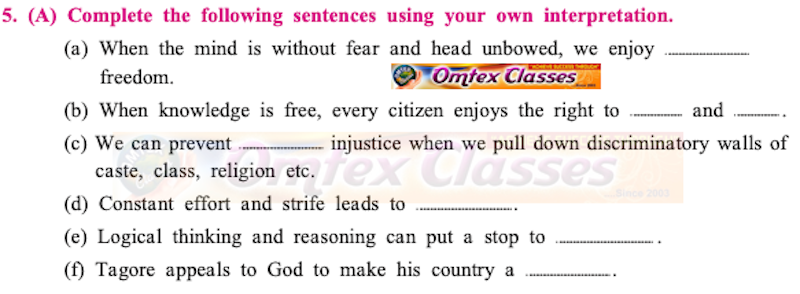Ans.
Ans. (a) absolute
(b) literacy and education
(c) social
(d) success
(d) superstitions
(e) heaven of freedom
Ans. (a) discrimination and narrow-mindedness
(b) knowledge is accessible
(c) superstitious beliefs
(d) broad-minded
(e) speak the truth
Answer: (i) “By narrow domestic walls”
Metaphor - An indirect comparison has been made between ‘narrow domestic walls’ and ‘narrow-minded divisions in the society’.
(ii) “Where the clear stream of reason has not lost its way.”
Metaphor - An indirect comparison has been made between the ‘clarity of a stream’ and ‘reason’.
(iii) “Into the dreary desert sand of dead habit”
Metaphor - An indirect comparison has been made between ‘habit’ and ‘desert sand’.
Ans. Where the bells always chime
Where projects are submitted on time
Where teachers guide us and make us wise
Where together schoolmates play and rise
Where holidays are not such a pleasant sight
Such is our school, our only delight!
[Note: The above answer is for reference. Students can compose a poem on ‘Ideal School’ on their own by taking cue from the above.
Answer: The title of the poem is ‘Where the Mind is Without Fear …’ It is composed by the great Rabindranath Tagore.
There is no fixed rhyme scheme in the poem as it is written in a free verse format. My favourite line from the poem is, "Into that heaven of freedom, my Father, let my country awake", because it is not only a prayer to the Almighty, but also a message to the countrymen to awaken from the bondages of colonial-rule. The central idea of the poem is about the poet's vision of freedom for his country. He desires and prays for an overall awakening of the people of the nation and not just for political freedom. The figures of speech used in the poem are Alliteration Metaphor. Apostrophe, Personification and Synecdoche. Among the special features of the poem is the fact that it is a poem of hope as the poet is not happy with the present condition of the country, but he is hopeful for a better future. The poet uses many metaphors to elaborate the evils existing in the country. Each thought has been connected using the word 'where. The poem is full of positive and negative imagery as the poet envisions a better future while facing the bleak reality of today.
I like the poem for its beautiful dream of a free and equal place, where the fellowmen live with each other in peace and harmony. The poem has a universal appeal and is relevant even today.
India of my dreams
Good morning teachers, chief guests and my fellow students. I'm Amin from Class X 'B'. Today, I'm going to talk about “The India of my dreams'.
“India is the cradle of the human race, the birthplace of human speech, the mother of history, the grandmother of legend, and the great-grandmother of tradition.” These words by Mark Twain perfectly depict the rich cultural heritage, values and traditions of our nation. There is a harmony in its chaos, which forms a beautiful mosaic like no other country in the world. In the past couple of centuries, our country has gone from being one of the greatest nations of the world, to a nation engulfed in poverty and illiteracy.
However, I do believe that India's former glory can be restored. I, therefore, have a vision of an ideal India, where the country would redeem its stature as the most prominent nation in the world. It would no longer be bound by the chains of corruption and illiteracy. I wish that each and every citizen would be treated equally, that is, without any distinction on the basis of gender, class, caste or religion. The people would live in harmony and would actively perform their duties toward the nation.
India has the potential to reform itself and I dream that one day, it will pave the way for the world to create a healthy balance between development, humanity, and environment. The India of my dreams would heal the world from its present situation of over-consumerism and materialism.
I would like to end by saying that the moment we learn from our rich past and adapt it to the modern times, we would not only become a strong country, but also an iconic nation. Thank you all for your time and I hope that if we work together, we can definitely build ‘The India of my dreams'.
Answer: Rabindranath Tagore, was born on May 7, 1861 in Calcutta [now Kolkata], He was a Bengali poet, short-story writer, song composer, playwright, essayist, and painter who introduced new prose and verse forms and the use of colloquial language into Bengali literature, thereby freeing it from traditional models based on classical Sanskrit. He was highly influential in introducing Indian culture to the West and vice versa, and he is generally regarded as the outstanding creative artist of early 20th-century India. In 1913 he became the first non-European to receive the Nobel Prize for Literature. He was died on August 7, 1941 in Calcutta.








